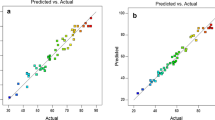Abstract
This study describes the optimization of the biodegradation of total aliphatic (tAHCs), total aromatic (tPAHs), and unresolved complex mixture (UCM) hydrocarbons from light crude oil in marine sediment. The response surface methodology (RSM), with a Box-Behnken design, was used to optimize the hydrocarbon fraction degradation, reported as degradation efficiency (E (%)), using four independent variables (inoculum, dispersant, light oil concentration, and carbon/nitrogen ratio), all at three levels. Analysis of variance (ANOVA) showed R2 values of 0.976, 0.974, and 0.975 for tAHCs, tPAHs, and UCM, respectively. All fractions exhibited a statistically significant effect (P < 0.05) in the second-order quadratic regression model for degradation. According to the models, the optimal degradation prediction was: 81.03% for tAHCs, 85.96% for tPAHs, and 92.86% for UCM. This work highlights the possibility of carrying out efficient biodegradation, of more than 80%, through an optimization process using different light oil concentrations, opening up possibilities of multiple response optimization.


Similar content being viewed by others
References
Bacosa HP, Erdner DL, Rosenheim BE et al (2018) Hydrocarbon degradation and response of seafloor sediment bacterial community in the Northern Gulf of Mexico to Light Louisiana Sweet crude oil. ISME J 12(10):2532–2543. https://doi.org/10.1038/s41396-018-0190-1
Beolchini F, Rocchetti L, Regoli F, Dell’Anno A (2010) Bioremediation of marine sediments contaminated by hydrocarbons: experimental analysis and kinetic modeling. J Hazard Mater 182(1–3):403–407. https://doi.org/10.1016/j.jhazmat.2010.06.047
Cai Z, Fu J, Liu W et al (2017) Effects of oil dispersants on settling of marine sediment particles and particle-facilitated distribution and transport of oil components. Mar Pollut Bull 114(1):408–418. https://doi.org/10.1016/j.marpolbul.2016.09.057
Crisafi F, Genovese M, Smedile F et al (2016) Bioremediation technologies for polluted seawater sampled after an oil-spill in Taranto Gulf (Italy): a comparison of biostimulation, bioaugmentation and use of a washing agent in microcosm studies. Mar Pollut Bull 106(1–2):119–126. https://doi.org/10.1016/j.marpolbul.2016.03.017
Doyle SM, Whitaker EA, De Pascuale V et al (2018) Rapid formation of microbe-oil aggregates and changes in community composition in coastal surface water following exposure to oil and the dispersant corexit. Front Microbiol 9:689. https://doi.org/10.3389/fmicb.2018.00689
Farag S, Soliman N, Abdel-Fattah Y (2018) Statistical optimization of crude oil bio-degradation by a local marine bacterium isolate Pseudomonas sp. sp48. J Genet Eng Biotechnol 16(2):409–420. https://doi.org/10.1016/j.jgeb.2018.01.001
Fodelianakis S, Soliman NA, Abdel-Fattah YR (2018) Statistical optimization of crude oil bio-degradation by a local marine bacterium isolate Pseudomonas Sp. Sp48. J Genet Eng Biotechnol 16(2):409–20. https://doi.org/10.1016/j.jgeb.2018.01.001
Fodelianakis S, Antoniou E, Mapelli F et al (2015) Allochthonous bioaugmentation in ex situ treatment of crude oil-polluted sediments in the presence of an effective degrading indigenous microbiome. J Hazard Mater 287:78–86. https://doi.org/10.1016/j.jhazmat.2015.01.038
García-Cruz NU, Sánchez-Avila JI, Valdés-Lozano D et al (2018) Biodegradation of hexadecane using sediments from rivers and lagoons of the Southern Gulf of Mexico. Mar Pollut Bull. https://doi.org/10.1016/j.marpolbul.2018.01.026
Heydarnezhad F, Hoodaji M, Shahriarinour M et al (2018) Optimizing toluene degradation by bacterial strain isolated from oil-polluted soils. Pol Environ Stud 27(2):655–663. https://doi.org/10.15244/pjoes/75811
Mapelli F, Scoma A, Michoud G et al (2017) Biotechnologies for marine oil spill cleanup. Trends in Biotechnol 35(9):860–870. https://doi.org/10.1016/j.tibtech.2017.04.003
Mohajeri L, Aziz HA, Isa MH et al (2010) A Statistical experiment design approach for optimizing biodegradation of weathered crude oil in coastal sediments. Bioresour Technol 101(3):893–900. https://doi.org/10.1016/j.biortech.2009.09.013
Overholt WA, Marks KP, Romero IC et al (2016) Hydrocarbon-degrading bacteria exhibit a species-specific response to dispersed oil while moderating ecotoxicity. Appl Environ Microbiol 82:518–527. https://doi.org/10.1128/AEM.02379-15
Prince RC, Butler JD, Redman AD (2017) The rate of crude oil biodegradation in the sea. Environ Sci Technol 51(3):1278–1284. https://doi.org/10.1021/acs.est.6b03207
Quigg A, Passow U, Daly KL et al (2020) Marine oil snow sedimentation and flocculent accumulation (MOSSFA) events: learning from the past to predict the future. In: Murawski SA (ed) Deep oil spills. Springer, Cham, pp 196–220
Ramasamy S, Arumugam A, Chandran P (2017) Optimization of Enterobacter Cloacae (KU923381) for diesel oil degradation using response surface methodology (RSM). J Microbiol 55(2):104–111. https://doi.org/10.1007/s12275-017-6265-2
Rattes de Almeida Couto C, Catharine de Assis Leite D, Jurelevicius D et al (2020) Chemical and biological dispersants differently affect the bacterial communities of uncontaminated and oil-contaminated marine water. Braz J Microbiol 51:691–700. https://doi.org/10.1007/s42770-019-00153-8
Vieira P, Faria S, Vieira R et al (2009) Statistical analysis and optimization of nitrogen, phosphorus, and inoculum concentrations for the biodegradation of petroleum hydrocarbons by response surface methodology. World J Microbiol Biotechnol 25(3):427–438. https://doi.org/10.1007/s11274-008-9907-z
Virupakshappa PK, Krishnaswamy MB, Mishra G et al (2016) Optimization of crude oil and PAHs degradation by Stenotrophomonas Rhizophila KX082814 strain through response surface methodology using Box-Behnken design. Biotechnol Res Int 2016:1–13. https://doi.org/10.1155/2016/476954
Xia W, Li J, Xia Y et al (2012) Optimization of diesel oil biodegradation in seawater using statistical experimental methodology. Water Sci Technol 66(6):1301–1309. https://doi.org/10.2166/wst.2012.323
Xu X, Liu W, Tian S et al (2018) Petroleum hydrocarbon-degrading bacteria for the remediation of oil pollution under aerobic conditions: a perspective analysis. Front Microbiol 9:2885
Acknowledgements
We would like to thank Rosa Cristina Canul Puc for her support during the sample analysis in CG-FID. This research was supported by the Mexican National Council for Science and Technology – CONACYT—Mexican Ministry of Energy—Hydrocarbon Fund, project 201441. This is a contribution of the Gulf of Mexico Research Consortium (CIGoM). We acknowledge PEMEX’s specific request to the Hydrocarbon Fund to address the environmental effects of oil spills in the Gulf of Mexico. IG-B received a CONACYT PhD fellowship 2018-000068-02NACF-30126.
Author information
Authors and Affiliations
Corresponding authors
Additional information
Publisher's Note
Springer Nature remains neutral with regard to jurisdictional claims in published maps and institutional affiliations.
Supplementary Information
Below is the link to the electronic supplementary material.
Rights and permissions
About this article
Cite this article
García-Bautista, I., García-Cruz, U., Pacheco, N. et al. Optimization of the Biodegradation of Aliphatic, Aromatic, and UCM Hydrocarbons from Light Crude Oil in Marine Sediment Using Response Surface Methodology (RSM). Bull Environ Contam Toxicol 108, 107–113 (2022). https://doi.org/10.1007/s00128-021-03281-w
Received:
Accepted:
Published:
Issue Date:
DOI: https://doi.org/10.1007/s00128-021-03281-w



